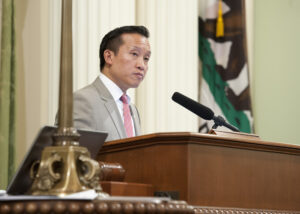Case concerns Arizona-led effort to intervene in litigation involving obsolete Trump immigration rule
SAN FRANCISCO (February 22, 2022) — San Francisco City Attorney David Chiu, Santa Clara County Counsel James R. Williams, and California Attorney General Rob Bonta issued the following statements on the eve of oral arguments before the United States Supreme Court in Arizona v. San Francisco. The case relates to an Arizona-led effort to intervene in litigation over the Trump Administration’s now-defunct “public charge” rule, which would have created a wealth test for immigrants entering the United States or going through the naturalization process and would have compelled immigrants to withdraw from public benefit programs.

“Implementing a wealth test for citizenship is simply un-American,” said San Francisco City Attorney David Chiu. “Thankfully, several courts across the country blocked Trump’s public charge rule from going into effect, and the Biden Administration revoked the rule. As we argued in our brief, Arizona should not be allowed to intervene to try to defend a defunct rule that is currently being replaced with a new rule that honors our legacy of welcoming immigrants.”
“Despite what Arizona might like to suggest, there is nothing in this case that will bring back the Trump-era public charge rule,” said California Attorney General Rob Bonta. “The rule no longer exists and numerous courts across the country have already ruled against it. Here in California, we stand in support of our immigrant communities and we look forward to continuing to advocate on their behalf.”
“As courts around the nation confirmed, the Trump Administration’s public charge rule was illegal. It was also a bad policy that hurt everyone in our community by making immigrants and their families afraid to access health-care and other services that affect entire families and neighborhoods,” said Santa Clara County Counsel James R. Williams. “The Supreme Court should not allow Arizona and others to intervene to defend this harmful rule—one that no longer even exists.”
Background
The U.S. Department of Homeland Security under President Trump announced a new rule on “Inadmissibility on Public Charge Grounds” on August 12, 2019, that would have rewritten nearly 140 years of legal precedent. It would have radically expanded the grounds upon which a person can be deemed likely to become a “public charge,” and thus denied a green card or entry into the U.S. By design, the Trump rule would have coerced individuals to forgo or withdraw from critical benefits and care.
San Francisco and the County of Santa Clara jointly filed the first case in the nation challenging the public charge rule. The Counties were later joined by two coalitions led by the States of California and Washington that also challenged the rule. The parties secured preliminary injunctions in October 2019 that were later upheld by the Ninth Circuit U.S. Court of Appeals. Based on similar arguments, a federal district court in Illinois entered a final judgment in a separate case vacating the rule nationwide.
The Trump Administration sought review of the Ninth Circuit decision in the U.S. Supreme Court, but that case was eventually dismissed after the Justice Department, under the Biden Administration, dropped the case and announced the administration would not implement Trump’s rule. As a result, the rule no longer exists.
In 2021, a coalition of states, led by Arizona, sought to intervene in the Ninth Circuit in an attempt to seek further review of the decision affirming the preliminary injunctions. The Ninth Circuit denied that motion, and the matter is now before the U.S. Supreme Court.
The U.S. Supreme Court will hear oral arguments remotely on Wednesday, February 23, 2022, at 10 a.m. ET / 7 a.m. PT. The case is State of Arizona v. City and County of San Francisco, et al., U.S. Supreme Court, No. 20-1775.
###
